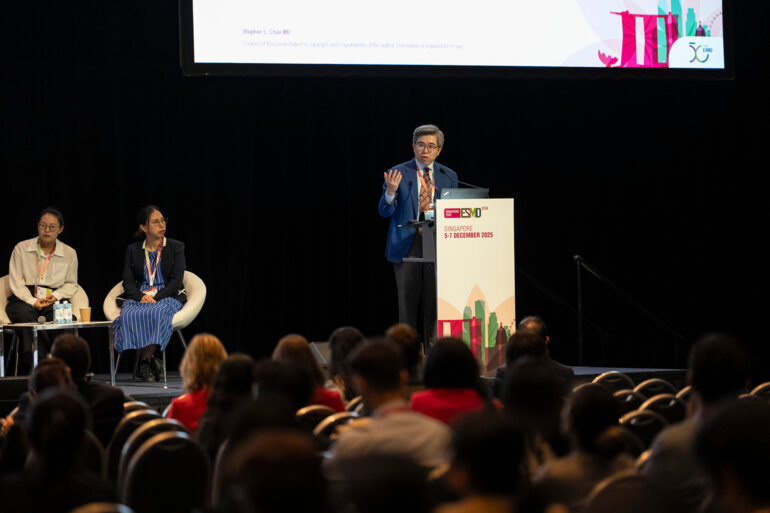Database studies in this rare cancer suggest that chemotherapy may provide survival benefit in node-positive tumours and that the KRAS G12D mutation could be a potential therapeutic target
At the ESMO Sarcoma and Rare Cancers Congress 2023 (Lugano, 20–22 March), insights from database studies involving patients with appendix adenocarcinoma were revealed in two presentations by investigators from The Christie NHS Foundation Trust in Manchester, UK.
In the first presentation of 216 patients with appendix adenocarcinoma treated between 2005 and 2021, multivariate analysis showed that among 46 patients with positive nodes, systemic chemotherapy reduced the risk of death compared with no chemotherapy (Abstract 8O). The association in patients with positive nodes was found across neoadjuvant or adjuvant chemotherapy (p=0.005), prior chemotherapy (p=0.011) and palliative chemotherapy (p<0.001). Median overall survival (OS) was not reached for neoadjuvant or adjuvant chemotherapy, was 81 months for prior chemotherapy and 28 months for palliative chemotherapy, which was significantly longer than with no chemotherapy (27 months) in each of the treatment settings (p=0.0019).
The study cohort had mainly mucinous disease (n=141) and 68% presented with metastatic disease. A total of 84% of patients had received cytoreductive surgery/hyperthermic intraoperative peritoneal chemotherapy (76% with mitomycin C) and 45% received systemic chemotherapy (29% first-line oxaliplatin/fluoropyrimidine). Across all 216 patients, the median OS was 122 months (95% confidence interval [CI] 62–182) after a median follow-up of 56 months.
“Due to its rarity, appendix adenocarcinoma has been studied much less than colon cancer and the use of chemotherapy in this type of tumour is controversial,” observes Dr Alvaro Arjona-Sánchez from Hospital Universitario Reina Sofía, Córdoba, Spain. “Therefore, it is striking that the results from this study show systemic chemotherapy based on fluoropyrimidine and oxaliplatin to be associated with improved survival, albeit in a small, and selected group of patients presenting with positive lymph nodes.”
In an earlier database analysis, systemic chemotherapy appeared to prolong survival in appendix adenocarcinomas with non-mucinous but not in mucinous histology (Cancer. 2016;122:213–221). Arjona-Sánchez continues: “Together with the new findings from the Manchester group, the evidence suggests that patients with appendix adenocarcinomas with positive lymph nodes and non-mucinous histology might derive some survival benefit from systemic chemotherapy.”
In the second presentation, next-generation sequencing (NGS) of up to 37 genes in primary tumour or peritoneal metastatic tissue collected between 2005 and 2022 from patients with appendix cancers (mainly goblet cell [n=25] and mucinous [n=21] histologies) revealed that KRAS mutations were seen in 27 of 53 evaluable samples (55%) (Abstract 10P). Nearly a quarter of these mutations (24%) were G12D. The median overall mutant allele frequency was 10%.
After a median follow-up of 51 months, OS was generally similar between patients with KRAS-mutated and KRAS-wild-type (wt) tumours, irrespective of histology or receipt of chemotherapy. However, among patients with KRAS wt tumours, treatment with combination of an anti-EGFR agent and chemotherapy was associated with a significantly shorter OS than treatment with chemotherapy alone (not reached versus 20 months; 95% CI 7–34; p=0.015). Other mutations revealed by NGS-based >300-gene panel testing of fresh blood from 6 patients included TP53, NRAS, GNAS, PI3KCA and BRCA2.
“The identification of the KRAS G12D mutation is very interesting because of the potential therapeutic implications, particularly given the interest surrounding KRAS G12D mutation inhibitors in development, such as MRTX1133,” says Arjona-Sánchez. The observation that RAS mutation status was not associated with poor prognosis is in keeping with previous findings in appendix adenocarcinoma. “The results may be somewhat limited by the fact that all histologies were considered as a single entity, whereas in reality, goblet cell carcinoma is closer to a neuroendocrine tumour and is totally different from mucinous disease,” concludes Arjona-Sánchez. “In addition, it would be interesting to know if molecular mutations identified in blood samples are related to survival, relapse or metastatic disease, particularly for mucinous carcinoma, where systemic expression is much less common than peritoneal expression.”
Abstracts discussed:
Strach MC, et al. Outcomes for patients with appendix adenocarcinoma and the role of systemic chemotherapy. ESMO Sarcoma and Rare Cancers Congress 2023, Abstract 8O
Proffered Paper Session – Rare Cancers, 20.03.2023, h. 10:50 – 12:10, Hall B3
Strach MC, et al. Molecular mutations in appendix cancers. ESMO Sarcoma and Rare Cancers Congress 2023, Abstract 10P
Poster Display Session, 21.03.2023, h. 12:10 – 13:10, Foyer (Ground floor)






